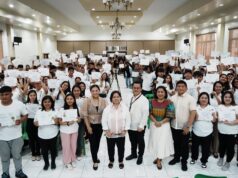CITY OF SAN FERNANDO – The Commission on Elections (Comelec) cancelled the testing of precinct count optical scan (PCOS) machines slated nationwide yesterday following reports of errors in tests already conducted in some precincts in Metro Manila and the Southern Tagalog region.
Comelec director for Central Luzon Zoilo Perlas told Punto that the testing has been rescheduled on May 7, merely three days before the elections on the 10th.
“I suppose it’s just a matter of configuring the memory card in case of erring PCOS machines,” Perlas said.
But he admitted he did not know how the machine provider Smartmatic-TIM would do this in the event that on May 7, many PCOS machines malfunction in various provinces all over the country as they did during the tests in Metro Manila and Southern Tagalog region.
The Comelec initially authorized precincts to test PCOS machines anytime from May 3 to 7 before they are resealed to be opened only on election day, Perlas said.
Tests conducted at precincts in Metro Manila indicated that some PCOS machines failed to read votes cast for some candidates. In some areas, only the names of Arroyo administration candidates registered in the machines.
“It’s a technical problem that we are not an expert about. But we were told the Smartmatic will assign one technician per precinct on election day to take care of any problem with the PCOS machine,” he added..
Perlas also said that the other reason cited by the Comelec central office in deferring the testing of PCOS machines is that some of them have not yet been delivered to their precincts. “Some are still in their provincial hub, but they are supposed to be deployed to the precincts by May 6,” he said.
He also said he expected that extra PCOS machines will be on standby in about 7,000 clustered precincts in Central Luzon as replacement for those that will malfunction. However, it is not clear exactly how many PCOS machine spares would be delivered per province.
Perlas also said that the Comelec central office’s directive to limit the time allotted for each voter to fill up his ballot could be problematical in the case of illiterate Aeta or other groups who have also registered for the coming polls.
“I can finish with my ballot in five to six minutes, but I can not say this about other people, especially those who are illiterate,” he said.
In telephone interview, National Commission on Indigenous People’s (NCIP) Executive Director Masli Quilaman said some 8.5 million indigenous peoples (IPs), including those who have remained illiterate, registered for the country’s first automated elections this May.
Quilaman said he has directed field personnel of the NCIP in the regions ensure assistance to illiterate IP’s so that they could be assisted by relatives in voting.
Perlas said his office has no statistics on how many IP’s are registered voters in his region, but noted that the law allows illiterate voters to be assisted by any relative up to first cousins. No literacy statistics was immediately available from the NCIP.
In the absence of any such relative, a member of the Board of Election Inspectors (BEI) is authorized to assist them, he added.
Comelec director for Central Luzon Zoilo Perlas told Punto that the testing has been rescheduled on May 7, merely three days before the elections on the 10th.
“I suppose it’s just a matter of configuring the memory card in case of erring PCOS machines,” Perlas said.
But he admitted he did not know how the machine provider Smartmatic-TIM would do this in the event that on May 7, many PCOS machines malfunction in various provinces all over the country as they did during the tests in Metro Manila and Southern Tagalog region.
The Comelec initially authorized precincts to test PCOS machines anytime from May 3 to 7 before they are resealed to be opened only on election day, Perlas said.
Tests conducted at precincts in Metro Manila indicated that some PCOS machines failed to read votes cast for some candidates. In some areas, only the names of Arroyo administration candidates registered in the machines.
“It’s a technical problem that we are not an expert about. But we were told the Smartmatic will assign one technician per precinct on election day to take care of any problem with the PCOS machine,” he added..
Perlas also said that the other reason cited by the Comelec central office in deferring the testing of PCOS machines is that some of them have not yet been delivered to their precincts. “Some are still in their provincial hub, but they are supposed to be deployed to the precincts by May 6,” he said.
He also said he expected that extra PCOS machines will be on standby in about 7,000 clustered precincts in Central Luzon as replacement for those that will malfunction. However, it is not clear exactly how many PCOS machine spares would be delivered per province.
Perlas also said that the Comelec central office’s directive to limit the time allotted for each voter to fill up his ballot could be problematical in the case of illiterate Aeta or other groups who have also registered for the coming polls.
“I can finish with my ballot in five to six minutes, but I can not say this about other people, especially those who are illiterate,” he said.
In telephone interview, National Commission on Indigenous People’s (NCIP) Executive Director Masli Quilaman said some 8.5 million indigenous peoples (IPs), including those who have remained illiterate, registered for the country’s first automated elections this May.
Quilaman said he has directed field personnel of the NCIP in the regions ensure assistance to illiterate IP’s so that they could be assisted by relatives in voting.
Perlas said his office has no statistics on how many IP’s are registered voters in his region, but noted that the law allows illiterate voters to be assisted by any relative up to first cousins. No literacy statistics was immediately available from the NCIP.
In the absence of any such relative, a member of the Board of Election Inspectors (BEI) is authorized to assist them, he added.



